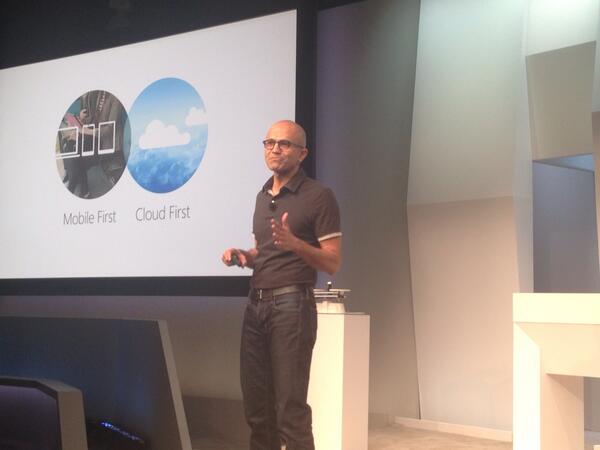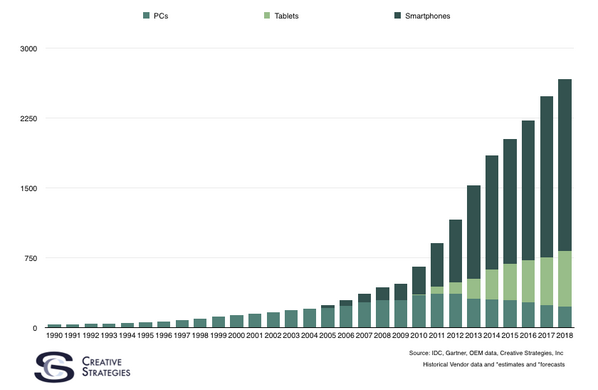On Tuesday, May 20, Microsoft held an event to unveil the Surface Pro 3 Tablet. You can view the webcast here. ((Ironically, the video stream provided by Microsoft is in Adobe Flash, so if you’re on a mobile device, you’re out of luck.)) NOTE: The quotes, below, are time stamped so you can locate them on the video.
I am breaking my coverage of the Microsoft Surface Tablet Event into two separate articles. Today, I will review the six minute introduction given by Microsoft CEO, Satya Nadella. In my opinion, Nadella’s statements were very revealing but not in the way he might have wished. Once we look “beneath the Surface” or “behind the curtain,” we can see that the contradictions inherent within Microsoft’s overall strategy force it to war with its customers, its partners and itself.
Tomorrow, in my Insider Article (subscription required), (now available, here) I will turn my attention to the specifics of why Microsoft’s grand strategy is self-contradictory and self-defeating. In essence, Microsoft is playing a game of Roshambo (rock, paper, scissors) and wants to simultaneously throw the rock, the paper and the scissors — with wholly predictable results.
Microsoft’s Mission?
- 01:53: “It starts for us with this obsession of empowering every individual and organization to do more and be more. That is what we at Microsoft are all about. This is what is the unifying theme for the company across everything that we do. We want products and technologies that enable people to dream and get stuff done, we want products and technologies that enable people to be able to get more out of every moment of their life. that’s the mission we are on.”

The good news is Satya Nadella seems to be able to articulate Microsoft’s vision better than Steve Ballmer ever did.
The bad news is the vision Nadella articulated wasn’t very compelling. I’m willing to give Nadella and Microsoft a pass on this because, if we are grading on a curve, very few companies have compelling visions. Not everyone, however, graded on a curve:
Ugh. Can someone please get Microsoft a new mission statement? Classic best-to-worst. ~ Ben Thompson (@monkbent)
It will be awfully hard for Microsoft to ever again create a mission statement as great as “A computer on every desk and in every home.” ((Bill Gates, Microsoft chairman and chief executive officer, 1980)) but merely saying Microsoft’s Mission is to create products and technologies that enable people to dream and get stuff done won’t cut it in the long run.
Competing Against Customers?
- 00:45: “Our cloud enables everyone on every device.”
03:09: “(T)hat’s what has led us to build the ubiquitous software products that we’ve built today.”
These statements raise more questions than they answer. If Microsoft wants to be on every device, if they want to have ubiquitous software, then does it make sense for them to build hardware too? Isn’t it an inherent conflict of interest to ask other companies to use your cloud services on their devices while simultaneously trying to replace their devices with your own?

Competing Against Partners?
- 04:55 “We’re not interested in competing with our OEMs ((OEM = Original Equipment Manufacturers))when it comes to hardware.”
Really? You sure have a funny way of showing it.
Nadella says that Microsoft isn’t interested in competing with its OEMs when it comes to hardware, a stance I don’t really understand. ~ Harry McCracken (@harrymccracken)
If Microsoft is not interested in competing with their OEMs — then why are they doing it? The Surface Tablet competes directly with Microsoft’s own (so-called) hardware partners. And what hardware company in their right mind wants to license software from Microsoft in order to build hardware that then has to compete against Microsoft-branded, and Microsoft software-integrated, hardware?
The hardest thing to explain is the glaringly evident which everybody had decided not to see. ~ Ayn Rand

Why Hardware?
- 04:05 “The question that needs to be asked and answered is why hardware?
I give Nadella full credit for asking the exact right question. I can’t, however, give him full marks for actually answering the question.
- …We are not building hardware for hardware’s sake. We want to build experiences that bring together all the capabilities of our company…to build these mobile first productivity experiences. That’s the mission.”
Hmm. Not really answering the question of “why hardware” just yet.
- …In fact our goal is to create new categories and spark new demand for our entire ecosystem. That’s what inspires us and motivates us with what we’re doing in our devices and hardware.
Hmm. Microsoft wants to create new categories and spark new demand. Sounds good, as far as it goes. But honestly, what company doesn’t want to create new categories and spark new demand? The real question then is: “What category is the Surface Tablet creating and does that category deserve to exist?”
- 05:30 Can we design and build a device that takes the best of the tablet and the laptop and enables any individual to be able to read and to be able to create and write; allows you to watch a movie and make a movie; enjoy art and create art — that’s the device we want to create.

CAPTION: The Surface Hybrid seeks to create a new category between the PC and the Tablet
Now the picture is coming into focus. Microsoft doesn’t believe tablets are always good enough. Microsoft doesn’t believe notebooks are always good enough. What people really want, what people really need, according to Satya Nadella, is a hybrid computer — like the Surface Tablet — that’s the best of both worlds. A device both a tablet AND a PC — one device that can do it all.
It is not the writer’s task to answer questions but to question answers. ~ Edward Abbey
However, if Microsoft’s answer to the question: “Why Hardware?” is “New Category Creation”, that begets a whole new set of questions:
- If the hybrid category is so compelling, so wanted, so needed, then why couldn’t Microsoft’s hardware partners have taken the Windows 8 operating system, applied their hardware designs to it, and created the hybrid category on their own?
- Not every category deserves to exist. What makes Microsoft think the hybrid is deserving of being a category of its own?
- Creating a category is hard. Creating a category in hardware, which is outside of Microsoft’s core skill set, is harder still. Aside from “sparking new demand”, is there another, more obvious reason why Microsoft feels the need to create this new category?
Tomorrow?
The only interesting answers are those which destroy the questions. ~ Susan Sontag
Tomorrow, I take a deep dive into those questions and many more as well. Here’s a hint as to what we’ll be finding:
In business, as in Roshambo, you can never beat your competitors if you’re always beating yourself first.



